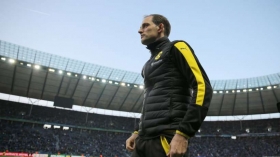Explaining Thomas Tuchel’s sacking
Explaining Thomas Tuchel’s sacking

The sacking of the 43-year-old might have been surprising to some football fans, but in retrospect, it was a question of when and not if Dortmund was going to fire Thomas Tuchel.
Borussia Dortmund’s decision to sack Thomas Tuchel boiled down to one primary reason – the strained relationship between the board members and the manager.
Thomas Tuchel has had a history of falling out with a club’s board. He left his previous club, Mainz, under fiery circumstances. Tuchel chose to leave the club with one year left on his contract despite the board not wanting to release him.
The 43-year-old had a stellar first season in charge with Dortmund, finishing runner-up in the league and recorded the highest point tally ever achieved by a second-placed team in the Bundesliga with 78 points.
The first signs of problems emerged in the summer transfer window following that season where there was a clear clash of interests regarding the club’s transfer policy.
Dortmund sold three very important players – Matt Hummels, Henrikh Mkhitaryan and Ilkay Gundogan. According to the Daily Mail, Tuchel was furious with the lack of effort to keep these three players and his team was left weak and unable to compete at the top level.
The recruitment of players such as Emre Mor and Ousmane Dembele was promising, but not enough to make up for the lack of experience in the squad to compete at the very top. Tuchel also admitted that it was the board’s decision to sign Swedish forward Aleksander Isac and he had never seen him play before.
It was clear that the Dortmund board prioritized the balancing of finances whereas Tuchel’s focus was purely on on-field performance. A lack of understanding from both sides for each other’s priorities made the foundation of the relationship extremely shaky.
What pushed it beyond repair were the comments made by Tuchel following the attacks on the Dortmund team bus before the Champions League quarter-final clash with Monaco.
Both UEFA and Dortmund agreed to postpone the match by a mere 24 hours. Tuchel publicly criticized the arrangement, questioning the decision made by both parties and accusing them of overlooking the players’ well-being.
Dortmund players were also seemingly against Tuchel, illustrated by their vocal public criticism of his decision to leave Nuri Sahin out of the squad for the German Cup final.
However, the core of the problem lies in the issues between Thomas Tuchel and the board at Dortmund. Coupling this with his tenure at Mainz shows a clear pattern – Tuchel has a fantastic football mind but is perhaps unable to strike a balance between on-field performance and the club’s administrative and financial performance, which would make him a difficult manager to work with.
While it might be unfair and premature to judge Thomas Tuchel’s managerial style from only two experiences, it seems that in a new era of football where the administration of the club is increasingly vital, Tuchel has not quite adjusted his traits for the rigours of dealing with a board of directors in a football club.


